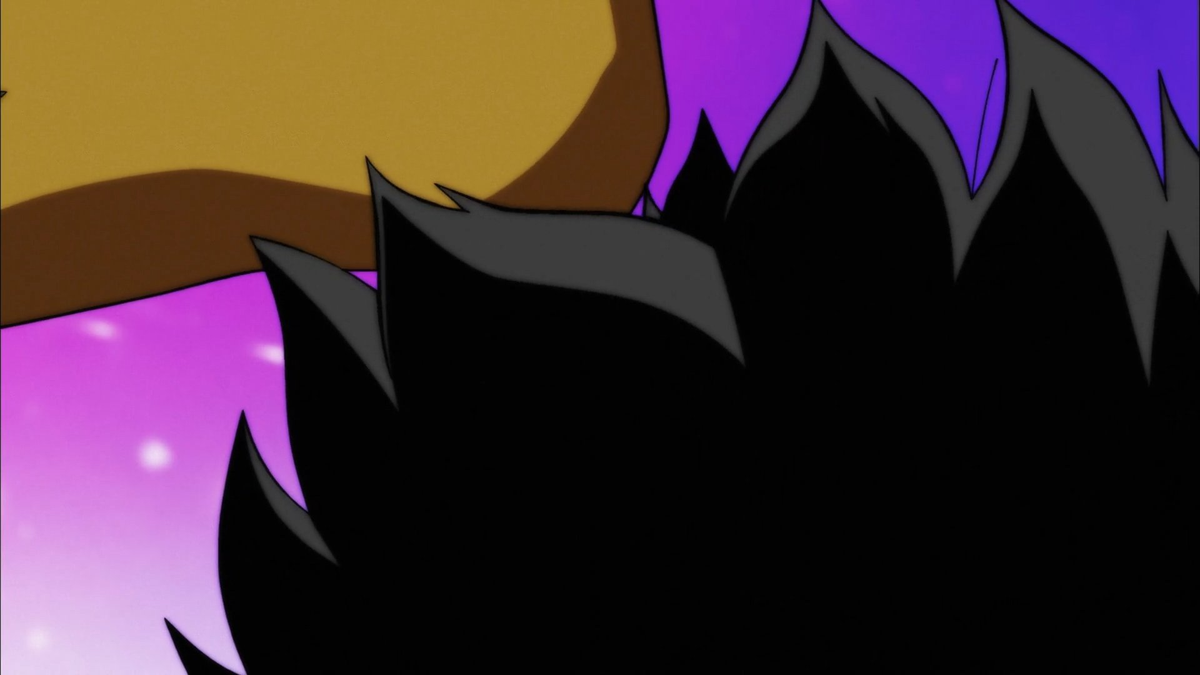Episodes #77-81 are all written by Tomioka Atsuhiro, who had been the sort of unofficial head writer since the Gokuu Black arc, and I think it really goes to show just how good he is not only as a writer for battle series like Dragon Ball, but also in the strength of having a consistent writer for a story arc. There are shades of Tomioka's Pokemon tournament arcs in these episodes (he's written multiple multi-episode tournaments before), but also there's a sense of fun and excitement that feels lacking from the Toriyama-penned movies and Daima.
I think what most sticks out about these episodes is how they're written with a lot of sincerity, which I think really goes to show that this was a more optimal way of creating a new Dragon Ball story arc. Having a writer take Toriyama's ideas and flesh them out with their own without feeling so slavish to Toriyama's own personal tastes works really well in creating a sense of tension. Slice-of-life moments like Gokuu selling his crops or interacting with Goten and Blooma's family make these characters all feel so much more real, like they have something to lose, which ties in with the greater threat of all of Universe 7 being totally erased.
It feels like really basic writing 101, but I honestly love how that's the approach Tomioka and Series Director Nagamine took with crafting this first block of episodes. Throughout the exhibition match, Beerus has his little bits of commentary, but we also see how he worries about being erased, we see the angels—via Whis—not being particularly affected, but still acting as commentators on the politics unfolding before them, and we see the Kaioushin worry for their lives, too.
Hell, as boring as I find Gohan to be most of the time, I think the Tournament of Power arc's depiction really makes him a lot more interesting. He has opinions and views and scolds Gokuu for his carelessness, he takes up battling again and even indulges in Saiyan-esque tendencies by actually enjoying fighting. Those aren't exactly new for Gohan, but somehow the flow between episodes as we see Gohan step-by-step get from the office to the battlefield feels like a naturally progressing arc.
Also, that fight of his? Cool as hell. As cool as the ending of Dragon Ball Z Episode #184 is—Gohan transforming into a Super Saiyan 2 for the first time—I don't think he's ever had a moment as cool as when he waited until his hair was touched by Lavender's kick to be able to use that sense of physically feeling his foe to counter. The three official exhibition matches are full of those little details, but I really like this one the best.


Then Gohan uses his ki to do a radar-esque pinging trick to find his foe? Tomioka battle strategies at their finest, folks.
Speaking of which, this is where I want to highlight the importance of good 'sideline battle commentary':
Spoiler:
Battle stuff aside, I still really enjoy the smaller moments between the battles. Even though I know the ending, the fun really lies in seeing how these characters all interact and worry about their own wants and needs. The way that we almost never quite see the Zen-Ou making their decisions, while the Grand Priest seems to do all of the speaking for them, combined with the camera angles used, really make it seem like the Grand Priest as an agenda of his own at play, which I know is something that was widely speculated on during the original broadcast.
Gokuu's fight involving having the entire audience turn on him thanks to Bergamo's framing of the situation is also the sort of fun idea that I don't know if Toriyama would have written quite so dramatically. While ultimately, the real culprits are the Zen-Ou for their decisions to erase the universes, I really enjoy how Bergamo attacks Gokuu in a way other foes haven't: psychologically. Still, Gokuu doesn't really care too much about others' views, so he can overcome the heat in the room, but I think the good being done is in helping characterize those around Gokuu, thus helping to highlight Gokuu's uniqueness in his environment, while also challenging the audience to think.
These are such densely-packed episodes. The amount of new ideas and characters introduced is staggering, but it alls feels so seamless and natural. The build up from slice-of-life to political drama, to action, to wrapping up and establishing the goal for the next block of episodes works really, really well in that regard.
Has anyone else recently rewatched this section of Dragon Ball Super? I'm curious what y'all think, because I had an absolute blast with these episodes and I think taking the time to go back and rewatch them would be a fun way to spend an afternoon or whatever.










